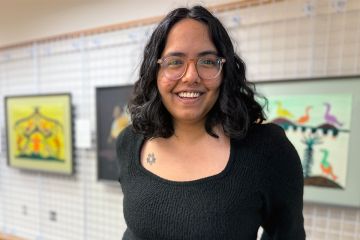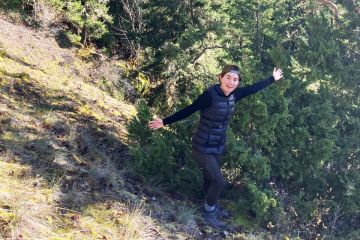Wild game and words feed inspiration for TV host and Indigenous language revitalization grad
- Tara Sharpe

Art Napoleon was already a national figure when his TV show, Moosemeat & Marmalade, premiered on APTN in January 2015. He had performed at the Canadian Aboriginal Music Awards, opened for Buffy Sainte-Marie and been interviewed by veteran correspondent Tom Hawthorn for the Globe and Mail in September 2010 for the release of his album Creeland Covers, sung almost exclusively in Cree.
Moosemeat & Marmalade is a “comedic documentary adventure and cultural clash,” says Napoleon, who graduates in June 2015 with an MA from the Faculty of Humanities. (The show has been nominated for a 2015 Leo Award.)
Napoleon was raised on moosemeat and wild game in an inter-tribal community at East Moberly Lake—in the woodlands of northeastern BC. “To eat traditional food, it’s like you’re tasting a piece of my culture,” he says. As co-host and producer of the new TV series, he hunted moose and foraged for berries then presented his culinary creations—all on camera.
He points out the English word “moose” comes from the Cree word môswa. Much like the majestic animal pierced by the sharp tip of a hunting weapon, words can help pin important paradigms in place for broader understanding. Napoleon, a graduate of UVic’s Department of Linguistics as well as Indigenous Education in the Faculty of Education, did his master’s thesis on traditional concepts related to Cree worldview through the lens of nnîhiyawîwin, the Cree language. A holistic focus on the Cree language and worldview is part of why he avoids standard dictionary approaches to translation.
“None of this approach is new; what is new is compartmentalization,” explains Napoleon. “The language itself provides clues to our ways of thinking, clues to our past.
“One example is the Cree word for ‘thunder.’ You’d need a whole sentence in English to translate our word: ‘The thunderbirds are calling out to one another’!
“Another example is the English word for ‘green.’ In Cree, it’s ‘the colour of the land in summer’ or ‘summer-like colour.’
“I come from a holistic paradigm and I can’t isolate anything from anything else. It is a more of a circle, a circling. And the beauty of the Cree language is that it allows you to see that really clearly.”
Napoleon is the first master’s student in UVic’s Indigenous Language Revitalization program to complete an MA. He describes himself on Twitter as a TV producer, songwriter, adventurer and wild game foodie, as well as a “weekend shape-shifter and extreme berry picker.”
Based in Victoria since 2003, he remains connected to his home territory and his Cree and Dane Zaa roots.
As a child, I was forced to dig in the garden, season the wood and haul it, clean the fishing nets, water and take care of the horses. Every child knew how to make a fire at four years old. And I still feel like the land is able to feed me. -- Art Napoleon, MA graduate, UVic Department of Linguistics (humanities) and Indigenous Education (education)
He brings his two youngest daughters home to the Peace region each summer, where he hunts and forages to fill his city cupboards and freezer for the winter.
“My kids swim in the lake and tell stories by the fire. If you asked them whether they’d like to go to Hawaii or Europe for the holiday, they’d say Moberly.”
He was Chief of the Saulteau First Nation for a short time before moving to the coast. He is a seasoned performance artist and musician who tours regularly and also serves as a juror on arts and culture organizations across Canada. He is also a language teacher and a long-time consultant and advisor.
He plans to write a book on aspects of the Cree language and culture, and has a suitcase literally stuffed with ideas and notes for future writing projects.
He adds he also has “an activist side, out of necessity.” He is a conservationist involved in protests against the Site C dam, the proposed project which is “at the doorstep of my community and will affect the river.”
Cariboo were “once like ants” across the land of his ancestral home—also the “heart of moose country”—and he remembers hearing moose bellowing and fighting. Now “it is hard to even find one.”
You can bet a cookbook is very likely in his future. What is not as safe a bet is the continuation of fresh air, clean water and wild game in plenty that once tempted and inspired his ancestors in both song and hunt.
Photos
In this story
Keywords: convocation, student life, diet, wildlife, alumni, graduate research, Indigenous, languages and linguistics





